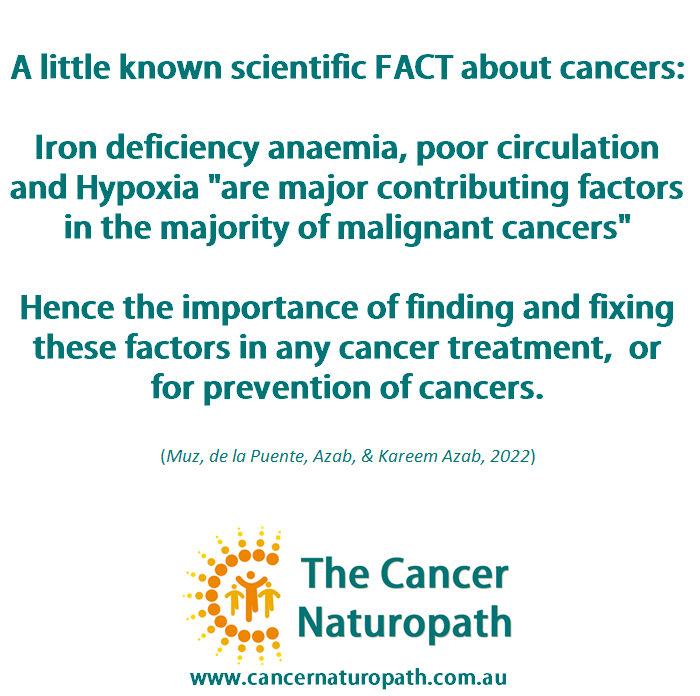|
The development and progression of cancer has a lot of causative factors, which can be different in each person. Cancer ALWAYS has known causes, and always has more than one cause in each person.
I have noticed a number of common factors in recent cancer cases, and one of the main factors is having low iron levels, or iron deficiency anaemia. Iron is needed, amongst other things, to make haemoglobin, the oxygen-carrying protein in the red blood cells. If there's not enough iron, haemoglobin production and red blood cell production and function will be affected, causing poor circulation, reduced oxygen supply to the cells and tissues, reduced function of all cells, reduced energy (as oxygen is needed for energy production), and other symptoms of muscle aches and pains, headaches and migraines, heart pains, higher heart/pulse rate (as the heart compensates for the lower oxygen supply), higher blood pressure, poor stamina, brain fog and confusion, fainting and dizziness, shortness of breath, pallor (pale skin), and more. The low oxygen level and poor circulation causes hypoxia, being low levels of oxygen in the body tissues. Other than with the above symptoms, hypoxia can be tested either with your doctor or other health practitioner with a "pulse oximeter" and confirmed with blood tests too. However, start with blood tests if you have any of the above symptoms, as a lower oxygen saturation level from a pulse oximeter can be slower to see the effects of the low iron and low haemoglobin levels. How does this relate to cancer? Hypoxia is a major contributing factor in the majority of malignant cancers (Muz, de la Puente, Azab, & Kareem Azab, 2022). Low oxygen levels alter cellular metabolism that can cause the cancer changes in healthy cells, as well as causing the dysfunctional blood supply around the cancer cells, increasing cancer cell signalling, causing spontaneous metastasis (spreading of the cancer to other parts of the body), development of a more aggressive cancer type, and reducing the effectiveness of typical medical cancer therapy treatments. But sadly, finding or addressing any hypoxia is not something that is a part of a normal medical cancer treatment or protocol. But this IS something that I look for and will include in my more holistic treatment plan where needed. Just taking iron supplements to improve haemoglobin or red blood cell levels isn't the answer to hypoxia. There are multiple root causes of low iron levels and hypoxia, which all need to be checked and confirmed or ruled out, before implementing a plan to fix the causes of the low iron and low circulation and low oxygen levels. However, you need to get your blood test results interpreted properly from an IIFP trained practitioner (via the Institute for Integrative and Functional Pathology) and not your GP. Finding and treating the hypoxia and iron deficiency anaemia isn't difficult and doesn't take too long! And people with chronic iron deficiency anaemia and hypoxia will start to feel improvements and reduction of symptoms quite quickly! Cancers are a complex and chronic result of multiple root causes and causative factors, which must all be found in each person, to improve whole body function, and to start to heal. Or you can, at least in part, prevent cancer development and progression by finding and treating any iron deficiency anaemia issues. If you have had a history of low iron levels, then you need this investigated further to find the causes of this in you, for prevention of long-term health issues, and for long-term resolution. Stay healthy! References: Muz, B., de la Puente, P., Azab, F., & Kareem Azab, A. (2022). The role of hypoxia in cancer progression, angiogenesis, metastasis, and resistance to therapy. Hypoxia (Auckland), 3: 83–92. doi: 10.2147/HP.S93413
0 Comments
|
AuthorWrite something about yourself. No need to be fancy, just an overview. Archives
February 2023
Categories
All
|


 RSS Feed
RSS Feed